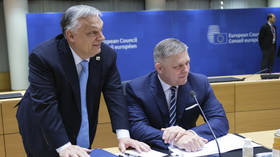Decent compromise? Deal on UK ‘special status’ gets unanimous EU support
UK Prime Minister David Cameron has reached an agreement with the 28 nation bloc in overtime on Friday after two days of intense negotiations which sought concessions from the EU with regards to the UK’s membership.
The European Union Council President Donald Tusk has confirmed that an agreement to keep Britain in the bloc won the unanimous support of all 28 EU states.
Deal. Unanimous support for new settlement for #UKinEU
— Donald Tusk (@eucopresident) February 19, 2016
The EU Commission President Jean-Claude Juncker expressed satisfaction that “months of hard work” had paid off when the block reached the new deal.
#UKinEU Deal done. Months of hard work w/ @eucopresident + cooperation w/ @Europarl_EN paid off. Happy. Fair for UK, fair for 27 #EU States
— Jean-Claude Juncker (@JunckerEU) February 19, 2016
Lithuanian President Dalia Grybauskaite was the first to announce that the “drama is over” as the tough negotiations moved to a British dinner on Friday evening.
Agreement #UKinEU done. Drama over.
— Dalia Grybauskaitė (@Grybauskaite_LT) February 19, 2016
Czech Republic Prime Minister, Bohuslav Sobotka, whose country was one of the four eastern European states which fought against Cameron’s calls to limit welfare benefits for EU migrants, has called the agreement a “decent compromise.”
Cameron will now take the new deal back to the UK where he will hold a cabinet meeting on Saturday. He said the new agreement will give the UK a “special status.”
I have negotiated a deal to give the UK special status in the EU. I will be recommending it to Cabinet tomorrow. Press conference shortly.
— David Cameron (@David_Cameron) February 19, 2016
“British people will be safer remaining in a reformed Europe,” Cameron said at the press conference, adding that the union “brings jobs, it brings investment.”
“We will never join the Euro,” Cameron declared, also promising to never participate in union-wide bailouts or join the EU armed forces.
BREAKING: Britain will be stronger in a reformed Europe, David Cameron says of #UKinEU deal https://t.co/UFYXVFdeCvhttps://t.co/pwhwhxXxMQ
— Bloomberg Business (@business) February 19, 2016
However, selling this hard-earned package to the UK’s eurosceptics across the country’s political spectrum and the British public at large might prove to be a difficult task.Speaking to RT at the height of the tense negotiations in Brussels, the head of the UK Independence Party (UKIP) Nigel Farage said that no matter what deal Cameron takes back to London there will still be no guarantees for Britain.
READ MORE: British PM begging for EU concessions ‘humbling and humiliating’ – UKIP’s Farage to RT
“He cannot look at the British people in the eye and guarantee them this is where we will end up, even if he wins a referendum on us staying members of the union,” the UKIP chief told RT. Farage explained that “nearly half” of the European Parliament opposes the new renegotiation of the existing treaties, while the European Court of Justice offers “little promise that Britain is not going to get committed to further political integration.”
The agreement, hailed by Cameron as a victory, has already been criticized by Eurosceptic MEP Daniel Hannan as bringing no real power back from Brussels to the UK.
“The PM says we’ll be ‘out of the parts that don't suit us’. But NOT A SINGLE POLICY is being returned from Brussels to Britain,” Hannan tweeted after the announcement of the deal.
The summit in Brussels which kicked of Thursday is crucial ahead of the British referendum on EU membership that could come as soon June.
According to Reuters the new draft agreement sets the emergency brake on migrant benefits at seven years. The benefits are also not extendable. The UK will also be able to cut child benefit claims for EU migrants from 2020.
Leaked Brexit draft: non-euro emergency brake can be pulled by one country. Win for Cameron pic.twitter.com/P7Twyma0nx
— Alex Barker (@alexebarker) February 19, 2016
With regards to the British sovereignty, the draft agreement states that the EU “recognizes that the United Kingdom...is not committed to further political integration into the European Union.” The text add that that all “the references to ever closer union do not apply to the United Kingdom.”
Meanwhile, with regards to the “exportation of child benefits,” the draft text says it will be applied “only to new claims made by EU workers in the host Member State.” It also adds that starting from January 2020, “all Member States may extend indexation to existing claims to child benefits already exported by EU workers.”
However, should the UK referendum take place and people vote to leave the European Union, all the agreements reached will self-destruct and the deal will reportedly “cease to exist.”
Leaked Brexit draft: The self destruct clause in summit conclusions. Doesn't kill off second referendum idea pic.twitter.com/3nFmOEZe2N
— Alex Barker (@alexebarker) February 19, 2016












